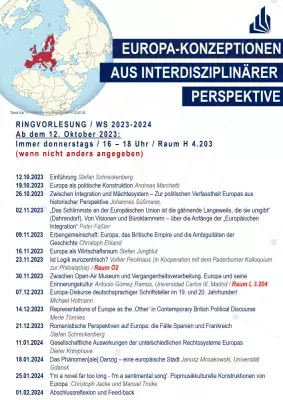Nasi wykładowcy poprowadzą kurs europeistyki: bałtyckości i gedanistyki dla studentów z Niemiec. Wykłady online mają charakter otwarty
Wykłady profesorów: Kazimierza Musiała z Instytutu Skandynawistyki i Fennistyki oraz Janusza Mosakowskiego z Instytutu Filologii Polskiej w ramach kursu europeistyki Paderborner Europa-Vorlesungen na Uniwersytecie w Paderborn w Niemczech:
Europa-Konzeptionen aus interdisziplinären Perspektive czyli Koncepcje Europy z perspektywy interdyscyplinarnej to wystąpienie dr Janusza Mosakowkiego w języku niemieckim w ramach cyklu wykładów (tzw. Ringvorlesung). Dr Janusz Mosakowski wygłosi także wykład zakończony dyskusją ze studentami zatytułowany Das Phänomen[ale] Danzig – eine europäische Stadt,/ Fenomen(alny) Gdańsk - europejskie miasto. W jego ramach tego wykładu dr Mosakowski zaprezentuj poglądowo frapującą i bogatą historię Gdańska jako miasta o tradycjach i ambicjach europejskich.

In the decades following the Cold War, the area surrounding the Baltic Sea offered a litmus test of European integration. It demonstrated how the EU expansion could be realized in a peaceful manner and how relations with the non-EU states could be turned into opportunities rather than remain constant challenges. The Russian invasion of Ukraine in 2022 created a critical juncture exacerbating a cognitive dissonance between the official narratives of regional cooperation including Russia and the harsh perception of being threatened by the Russian state as a potential enemy. Rapid changes in the social reality make individual Baltic Sea countries and institutions, like the Council of the Baltic Sea States, change their regional policies and action plans. Sweden and Finland become members of NATO, regional integration is under review and new identity narratives emerge in all countries of the region.
The presentation will provide insights into the current developments in the Baltic Sea region, and it will put them in a historical perspective by discussing ongoing identity shifts and their mechanisms in the region during other critical junctures in the 1990s and the 2000s. Changing ideologies, imaginaries and ontologies that influenced regional identity construction in this part of Europe will be highlighted, while institutions, policies and strategies that have been developed to sustain the Baltic Sea regionalism will be explored as possibly relevant for other regional dimensions of the EU.
Głównym celem wykładów w ramach kursu europeistyki jest zachęcenie studentów z Uniwersytetu w Paderborn do przyjazdu na jeden semestr na studia na naszym na Wydziale Filologicznym Uniwersytetu Gdańskiego (tego rodzaju wyjazd jest w ramach ich specjalizacji obligatoryjny).
- Wykłady online mają charakter otwarty.
- Szczegóły pod linkiem: https://www.europaeischestudien.eu/termine/




